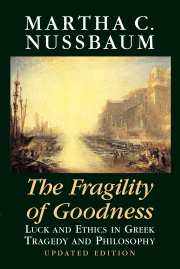Book contents
- Frontmatter
- Contents
- Preface to the revised edition
- Preface
- Acknowledgements
- Abbreviations
- Chapter 1 Luck and ethics
- Part I Tragedy: fragility and ambition
- Part II Plato: goodness without fragility?
- Part III Aristotle: the fragility of the good human life
- Introduction
- Chapter 8 Saving Aristotle's appearances
- Chapter 9 Rational animals and the explanation of action
- Chapter 10 Non-scientific deliberation
- Chapter 11 The vulnerability of the good human life: activity and disaster
- Chapter 12 The vulnerability of the good human life: relational goods
- Appendix to Part III Human and divine
- Interlude 2 Luck and the tragic emotions
- Epilogue: Tragedy
- Chapter 13 The betrayal of convention: a reading of Euripides' Hecuba
- Notes
- Bibliography
- General index
- Index of passages
Chapter 8 - Saving Aristotle's appearances
Published online by Cambridge University Press: 05 June 2013
- Frontmatter
- Contents
- Preface to the revised edition
- Preface
- Acknowledgements
- Abbreviations
- Chapter 1 Luck and ethics
- Part I Tragedy: fragility and ambition
- Part II Plato: goodness without fragility?
- Part III Aristotle: the fragility of the good human life
- Introduction
- Chapter 8 Saving Aristotle's appearances
- Chapter 9 Rational animals and the explanation of action
- Chapter 10 Non-scientific deliberation
- Chapter 11 The vulnerability of the good human life: activity and disaster
- Chapter 12 The vulnerability of the good human life: relational goods
- Appendix to Part III Human and divine
- Interlude 2 Luck and the tragic emotions
- Epilogue: Tragedy
- Chapter 13 The betrayal of convention: a reading of Euripides' Hecuba
- Notes
- Bibliography
- General index
- Index of passages
Summary
At the beginning of Book vii of the Nicomachean Ethics, just before his discussion of akrasia, Aristotle pauses to make some observations about his philosophical method:
Here, as in all other cases, we must set down the appearances (phainomena) and, first working through the puzzles (diaporēsantas), in this way go on to show, if possible, the truth of all the beliefs we hold (ta endoxa) about these experiences; and, if this is not possible, the truth of the greatest number and the most authoritative. For if the difficulties are resolved and the beliefs (endoxa) are left in place, we will have done enough showing.
(1145b1ff.)Aristotle tells us that his method, ‘here as in all other cases’, is to set down what he calls phainomena, and what we shall translate as ‘the appearances’. Proper philosophical method is committed to and limited by these. If we work through the difficulties with which the phainomena confront us and leave the greatest number and the most basic intact, we will have gone as far as philosophy can, or should, go.
This theoretical remark is closely followed by an application of the method. Aristotle first reports some of our most common beliefs and sayings about akrasia, concluding his summary with the words, ‘These, then, are the things we say (ta legomena)’ (1145b20). Next he presents the Socratic view that nobody does wrong willingly: we choose the lesser good only as a result of ignorance.
- Type
- Chapter
- Information
- The Fragility of GoodnessLuck and Ethics in Greek Tragedy and Philosophy, pp. 240 - 263Publisher: Cambridge University PressPrint publication year: 2001



